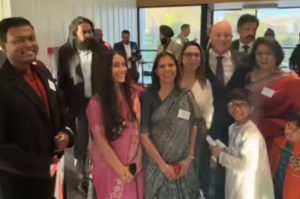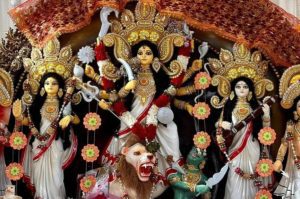Indian Diaspora in New Zealand: As New Zealand approaches its upcoming general elections, Prime Minister Christopher Luxon has intensified his engagement with the country’s Indian diaspora, the third-largest ethnic group in the nation. This is not a mere gesture of goodwill but a carefully calibrated strategy that blends domestic politics with international diplomacy. His interactions with the Indian community in Christchurch, Auckland, and Wellington have been marked by cultural symbolism, electoral awareness, and a vision for strengthening bilateral relations with India.

The diaspora’s importance cannot be overstated: Indian New Zealanders today make up nearly 6% of the population, with strong representation in business, academia, medicine, IT, and public service. Their increasing electoral influence and role as cultural ambassadors have made them central to New Zealand’s evolving multicultural identity.
Luxon at the Christchurch Bengali Community Event
One of Luxon’s most visible gestures of cultural outreach took place in Christchurch, where he attended an event organized by the Christchurch Bengali Community Incorporated Society. The Prime Minister and his wife Amanda were not only welcomed warmly but were also invited to attend Durga Puja, one of the most important festivals in the Bengali calendar.
The symbolic resonance of this moment was significant. Luxon was gifted:
- A handcrafted umbrella decorated with Kolkata’s iconic landmarks such as the Howrah Bridge and the Victoria Memorial, symbols of India’s cultural grandeur.
- A copy of Rabindranath Tagore’s Gitanjali, a text that carries immense literary and philosophical weight, linking New Zealand’s cultural respect to Bengal’s intellectual heritage.
These gestures went beyond ceremonial pleasantries. They highlighted a fusion of Indian cultural pride with New Zealand’s inclusivity narrative, projecting Luxon as a leader who is both culturally aware and politically astute.


Why the Indian Community Matters Politically
The Indian diaspora has steadily transformed into a pivotal voting bloc. Historically, New Zealand politics leaned heavily on European-origin and Māori voters, but demographic changes have reshaped the electoral map. Today, Indian-origin voters are especially influential in urban constituencies such as Auckland Central, Manukau, and Mount Roskill, where migrant populations form significant portions of the electorate.
For Luxon and the National Party, this represents both a challenge and an opportunity. To secure electoral success, they must:
- Acknowledge cultural diversity.
- Address issues like immigration policies, student visa reforms, healthcare access, and small business support.
- Present themselves as leaders who not only govern but also embrace the plural identity of modern New Zealand.
The outreach also neutralizes the perception that the National Party caters primarily to majority communities. By visibly engaging with the Indian diaspora, Luxon is broadening his electoral coalition.
Beyond Politics: A Diplomatic Bridge with India
Luxon’s outreach is not confined to domestic electoral arithmetic. It also ties into his administration’s foreign policy pivot toward India as a strategic partner. In March 2025, Luxon traveled to India, where he:
- Met Prime Minister Narendra Modi.
- Launched preliminary discussions on a Free Trade Agreement.
- Participated in the Raisina Dialogue, a premier forum on geopolitics.
- Signed agreements covering defence cooperation, education, forestry, horticulture, and sports exchange.
These moves signal that New Zealand recognizes India’s growing geopolitical and economic importance. For decades, trade relations between the two countries remained underdeveloped compared to New Zealand’s ties with China and Australia. But now, with India’s rise as a global power, Wellington is recalibrating its priorities.
The Indian diaspora in New Zealand becomes a natural diplomatic bridge in this context. They are simultaneously citizens of New Zealand and carriers of Indian heritage, making them key interlocutors in strengthening bilateral cooperation.
Cultural Identity and Symbolic Politics
Luxon’s gestures toward Indian festivals like Durga Puja and Diwali carry deep symbolic weight. Festivals are not just religious or cultural gatherings—they are opportunities for diaspora communities to affirm identity in their adopted homeland.
For a Prime Minister to participate in these events means:
- Acknowledging the diaspora’s emotional connections with India.
- Validating their place in New Zealand’s national story.
- Positioning himself as a leader of all communities, not just the majority.
Symbolic politics, when combined with concrete policy action, helps build long-term trust. Luxon’s ability to weave cultural acknowledgment into political strategy may prove crucial in winning over skeptical migrant voters who often feel underrepresented.
Indian Diaspora in New Zealand: The Numbers Behind the Diaspora
According to Stats NZ, Indians constitute one of the fastest-growing ethnic groups in the country. They are concentrated in:
- Auckland: Nearly half of all Indian New Zealanders live here.
- Canterbury and Wellington: Growing communities tied to education and business.
Language statistics are equally striking. Hindi is now among the top five spoken languages in New Zealand, reflecting the community’s demographic depth.
These figures underscore why Luxon’s engagement is more than symbolic—it is electoral mathematics backed by demographic reality.
Community as a Policy Stakeholder
Beyond votes, the Indian diaspora has become a stakeholder in key policy areas:
- Education: Thousands of Indian students contribute to New Zealand’s economy. Issues of post-study work visas and immigration rules remain pressing.
- Healthcare: Indian-origin doctors and nurses form a vital part of the medical workforce.
- Business: From retail to IT, Indian entrepreneurs have created thriving enterprises, driving job growth.
- Politics: Leaders like Priyanca Radhakrishnan, the first Minister of Indian origin, reflect the community’s political rise.
For Luxon, engaging with this diaspora means engaging with a powerful constituency of professionals, entrepreneurs, and cultural leaders.
Election Strategy in a Multicultural Nation
New Zealand’s Mixed-Member Proportional (MMP) system ensures that minority voices matter. Under this system, smaller demographic shifts can alter election outcomes. Thus, Indian-origin voters could tip the scales in closely contested electorates.
Luxon’s campaign strategy appears to be acknowledging this reality:
- Positioning himself as inclusive.
- Framing his leadership around cultural respect.
- Building direct personal connections with migrant groups.
This is not unlike strategies used by leaders in Canada, the UK, and Australia, where Indian-origin communities play decisive electoral roles.
A Wider Global Pattern
Luxon’s outreach also reflects a global trend: the growing importance of Indian diasporas in shaping Western politics. In the United States, the United Kingdom, and Canada, Indian-origin politicians have risen to the highest offices. The New Zealand context, though smaller in scale, mirrors this trajectory.
By engaging with the diaspora now, Luxon is investing in long-term political capital. As demographic trends continue, the influence of Indian New Zealanders will only increase.
Conclusion
Christopher Luxon’s engagement with the Indian diaspora is a multilayered strategy. It blends electoral necessity, cultural diplomacy, and international relations. His symbolic presence at community events like Durga Puja, his gifting of cultural tokens, and his policy outreach to India are all part of a single, coherent narrative:
- Domestically, he seeks to broaden his voter base in a multicultural society.
- Internationally, he aims to strengthen New Zealand–India relations through people-to-people ties.
- Culturally, he positions himself as a leader who understands that New Zealand’s identity is no longer monolithic but plural.
In doing so, Luxon has highlighted the political centrality of the Indian diaspora. Whether this strategy translates into electoral success will depend on how convincingly he turns symbolic engagement into substantive policy.
🔗 External references for deeper reading:
- India–New Zealand Bilateral Relations – High Commission of India, Wellington
- Indian New Zealanders – Wikipedia
- India–New Zealand Relations – Wikipedia
- Stats NZ – Ethnic Population Highlights
Also read: Home | Channel 6 Network – Latest News, Breaking Updates: Politics, Business, Tech & More

